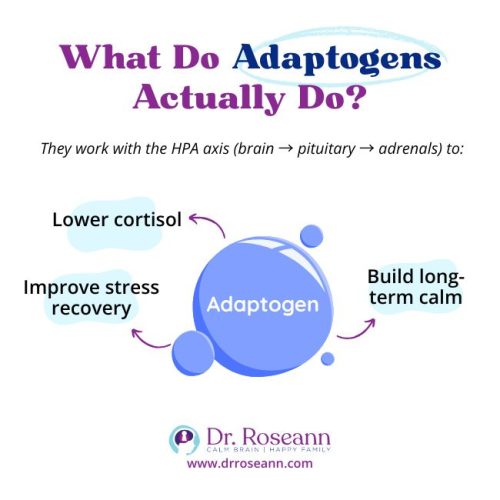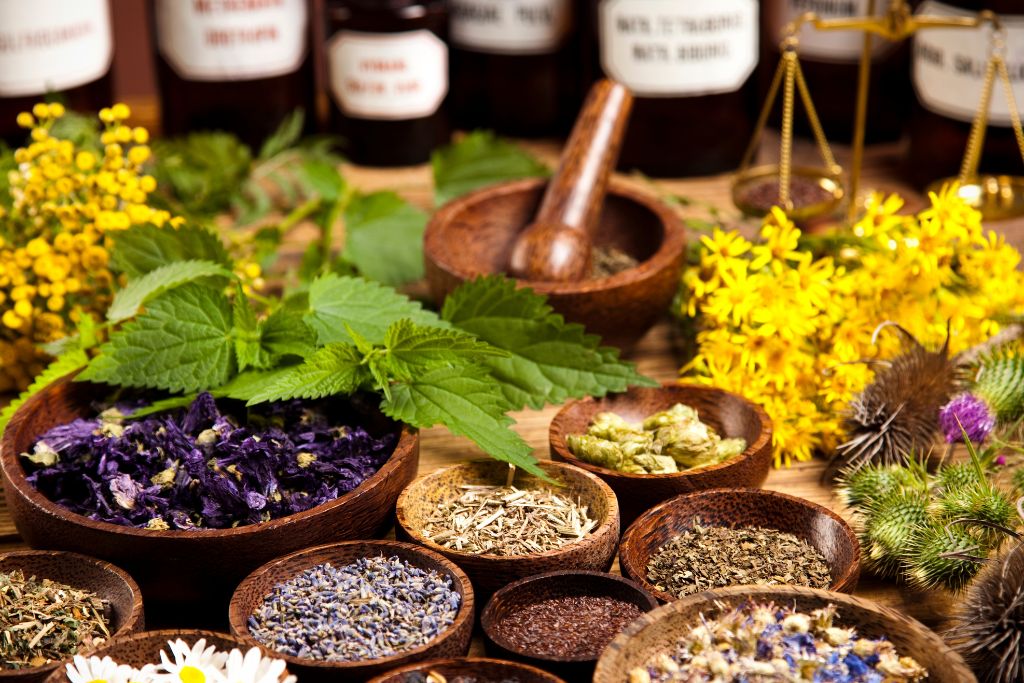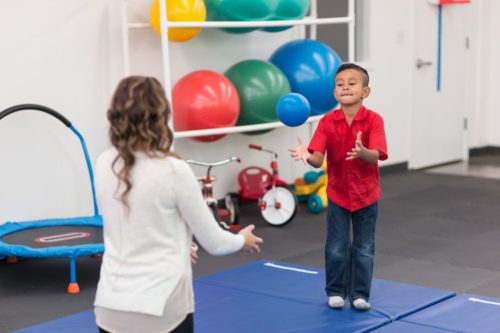Estimated reading time: 6 minutes
If your child seems stuck in a cycle of stress, irritability, or constant burnout, it’s not just in your head. These stress patterns are becoming more common in kids today, and they deserve serious attention.
New research shows that chronic stress isn’t just a grown-up problem. It’s altering kids’ brain development, emotional regulation, and even gut health. But there’s good news: natural tools like adaptogenic herbs are gaining traction for a reason — they support the stress response gently and effectively.
This guide breaks down what adaptogens are, how they work in children’s bodies, and which ones are safe and effective to support your child’s energy, mood, and behavior.
What Are Adaptogenic Herbs and How Do They Work?
Adaptogens are a special class of herbs that help the body resist the effects of physical, emotional, and chemical stress. They don’t stimulate or sedate. Instead, they bring the body back to balance by regulating the stress response over time.
Here’s what makes them unique:
- They work with the HPA axis (hypothalamic-pituitary-adrenal system) to regulate cortisol
- They support adrenal function, which is key to avoiding crashes or meltdowns
- They enhance resilience rather than masking symptoms

Can Adaptogens Really Help Kids With Stress?
Yes — when used correctly, adaptogenic herbs can be a powerful tool to help kids handle stress, irritability, and nervous system dysregulation.
Stress in kids often shows up as:
- More meltdowns or shutdowns
- Trouble sleeping or staying asleep
- Tummy aches, headaches, or other physical symptoms
- Emotional outbursts and sensory overwhelm
Adaptogens help calm the brain by supporting key systems that regulate mood, focus, and resilience.
Frances, a mom of a 16-year-old with ADHD and frequent meltdowns, started using rhodiola and magnesium under her practitioner’s guidance. Within weeks, she noticed fewer after-school crashes and better morning focus.
What Are the Best Adaptogenic Herbs for Children?
Not all adaptogens are safe for kids — and some work better for certain issues than others. These five are gentle, research-backed, and widely used in children:
- Rhodiola
Boosts energy and mental stamina, great for stress-related fatigue. - Ashwagandha
Reduces anxiety and stabilizes mood. Also supports sleep and cortisol levels. - Holy Basil (Tulsi)
Balances blood sugar and mood, great for irritability or emotional swings. - Eleuthero (Siberian Ginseng)
Improves resilience, focus, and physical endurance. - Licorice (DGL form)
Soothes adrenal fatigue and gut inflammation, often tied to mood swings.
How Do I Know If My Child Needs Adaptogenic Herbs?
If your child’s nervous system seems constantly overstimulated or depleted, adaptogens may be helpful.
Look for these signs:
- Daily meltdowns or emotional outbursts
- Fatigue that doesn’t match activity levels
- Trouble waking in the morning or falling asleep at night
- Always “on edge,” clingy, or emotionally fragile
Could Your Child Benefit from Adaptogens?
| Sign or Symptom | Possible Adaptogen Support |
|---|---|
| Frequent meltdowns | Rhodiola, Ashwagandha |
| Poor sleep or night wakings | Ashwagandha, Holy Basil |
| Fatigue despite rest | Rhodiola, Eleuthero |
| Easily overwhelmed/sensory | Holy Basil, Rhodiola |
| Mood swings or irritability | Holy Basil, Licorice (DGL) |
| Focus struggles at school | Rhodiola, Eleuthero |
Are Adaptogens Safe for Kids?
Most adaptogens have been used safely for centuries — but “natural” doesn’t always mean risk-free. It’s essential to:
- Use age-appropriate dosing
- Choose high-quality, reputable brands
- Work with a provider who understands children’s nervous system health
Some herbs (like ginseng or kava) may be too stimulating or sedating for sensitive children. That’s why choosing gentle, well-researched options is key.
Brain Science Spotlight
Recent research from the University of California, Irvine shows that chronic stress rewires the developing brain, weakening the prefrontal cortex and heightening reactivity in the amygdala. Dr. Tallie Z. Baram, lead author of the study published in Nature Neuroscience, explains:
“When children are exposed to unpredictable or excessive stress, it alters the neural pathways responsible for emotion and impulse control.”
This discovery confirms what we see clinically every day. A child stuck in survival mode isn’t choosing to be defiant — their brain is responding to overwhelm.
What this means for your family: Adaptogens and calming strategies that support the nervous system may help reverse some of that stress-induced reactivity over time.
What’s the Best Way to Use Adaptogens in Kids?
Adaptogens aren’t one-size-fits-all. Here’s how to use them wisely:
- Start with one herb at a time
- Give for at least 2–4 weeks to notice full effects
- Consider tinctures or glycerites for younger kids
- Pair with lifestyle changes (nutrition, sleep, nervous system regulation)
Dosage tip: Work with a practitioner familiar with pediatric use. The goal is gentle support — not sedation or stimulation.
Dr. Roseann’s Therapist Tip
“In my many years of clinical practice, I’ve learned that consistent, gentle tools often create the biggest changes. Here’s what I tell parents: Don’t expect a magic bullet — but do expect progress with steady use.
Try this today: Choose one adaptogenic herb and use it daily for 3 weeks. Keep a simple mood/behavior tracker.
Why it works: Adaptogens work best over time by regulating stress hormones and brain chemistry — not just masking symptoms.
Remember: These small steps add up. Keep going.”
How Fast Do Adaptogens Work for Stress Relief?
Most adaptogens don’t work overnight — but you may see:
- Subtle shifts in mood or energy in 1–2 weeks
- Improved focus, sleep, or fewer meltdowns in 3–4 weeks
- Bigger changes when paired with nervous system regulation
Consistency matters more than speed. These herbs are meant to support long-term balance, not suppress symptoms.
Jason, age 12, with PANS and sensory issues, started holy basil and magnesium daily. After three weeks, his mom reported fewer headaches and more “bounce back” after stress.
How Do Adaptogens Compare to Other Natural Solutions?
Adaptogens work best as part of a full nervous system support plan. That includes:
- Magnesium for calming the brain (like Dr. Roseann’s Neurotastic Multi-Mag)
- Omega-3s for brain inflammation
- PEMF therapy (like CALM PEMF) to balance electrical activity in the brain
- Breathwork, movement, and co-regulation
Final Thoughts on Adaptogenic Herbs for Stress
Adaptogenic herbs can be a game-changer for kids stuck in chronic stress, burnout, or reactivity. These gentle plants support the body’s stress systems and help build long-term resilience — when used correctly.
Start simple. Stay consistent. And most importantly, calm the brain first.
FAQs About Adaptogenic Herbs for Stress
What’s the best adaptogen for kids with anxiety?
Ashwagandha is commonly used for anxiety, but holy basil may be a gentler option for kids.
Can I give adaptogens daily?
Yes — daily use is typically recommended. Just monitor effects and adjust with your provider.
Are adaptogens the same as stimulants?
No. They balance energy without causing spikes or crashes.
Can I combine adaptogens with magnesium or PEMF?
Yes! In fact, they often work better together.
Citations
Kwon, C. Y., & Lee, B. (2023). The Effect of Herbal Medicine on Suicidal Behavior: A Protocol for Systematic Review and Meta-Analysis. Healthcare (Basel, Switzerland), 11(10), 1387. https://doi.org/10.3390/healthcare11101387
Mischoulon D. (2018). Popular Herbal and Natural Remedies Used in Psychiatry. Focus (American Psychiatric Publishing), 16(1), 2–11. https://doi.org/10.1176/appi.focus.20170041
Sarris J. (2018). Herbal medicines in the treatment of psychiatric disorders: 10-year updated review. Phytotherapy research : PTR, 32(7), 1147–1162. https://doi.org/10.1002/ptr.6055
Sarris, J., McIntyre, E., & Camfield, D. A. (2013). Plant-based medicines for anxiety disorders, part 2: a review of clinical studies with supporting preclinical evidence. CNS drugs, 27(4), 301–319. https://doi.org/10.1007/s40263-013-0059-9
Dr. Roseann is a mental health expert in Self-Regulation who frequently is in the media:
- Healthline Understanding Self-Regulation Skills
- Scary Mommy What Is Self-Regulation In Children, And How Can You Help Improve It?
- The Warrior Parent Podcast It’s Gonna Be OK! Changing Behaviors and Responses (And The Magic of Magnesium)In Your Family with Dr. Roseann Capanna-Hodge
Always remember… “Calm Brain, Happy Family™”
Disclaimer: This article is not intended to give health advice and it is recommended to consult with a physician before beginning any new wellness regime. *The effectiveness of diagnosis and treatment vary by patient and condition. Dr. Roseann Capanna-Hodge, LLC does not guarantee certain results.
Are you looking for SOLUTIONS for your struggling child or teen?
Dr. Roseann and her team are all about science-backed solutions, so you are in the right place!
©Dr. Roseann Capanna-Hodge








